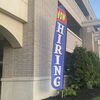A future of driverless trucks? Sen. Collins wants to know how that might impact workforce
 Courtesy / Office of Sen. Susan Collins
U.S. Sen. Susan Collins, R-Maine, has joined with U.S. Sen. Jack Reed, D-R.I., in asking the U.S. Government Accountability Office to examine the impact that driverless trucks and cars might have on the workforce.
Courtesy / Office of Sen. Susan Collins
U.S. Sen. Susan Collins, R-Maine, has joined with U.S. Sen. Jack Reed, D-R.I., in asking the U.S. Government Accountability Office to examine the impact that driverless trucks and cars might have on the workforce.
Last fall, an 18-wheeler loaded with 50,000 cans of Budweiser completed the world's first self-driving truck delivery, traveling 120 miles from a brewery in Fort Collins, Colo., to Colorado Springs.
Although there was a driver in the cab, his role was simply to make sure the $30,000 worth of computerized self-driving technology installed by the San Francisco startup Otto navigated the truck safely to its final destination. Once the truck hit the interstate, a high-tech autonomous driving system took over for a test run of what Otto's new owner, Uber, says is the future of trucking.
Uber bought the startup last summer for $680 million and, along with its efforts to develop a self-driving car, it's clearly making a substantial bet that self-driving vehicles will be on our highways sooner rather than later. Volvo, Daimler and Peterbilt are other companies seriously exploring self-driving trucks.
Impact on jobs?
With as many as 2 million Americans employed as truck drivers, U.S. Sen. Susan Collins, R-Maine, has joined with U.S. Sen. Jack Reed, D-R.I., in asking the U.S. Government Accountability Office to examine the impact that driverless trucks and cars might have on the workforce. Collins is chairwoman and Reed the ranking member on the Senate Appropriations Subcommittee on Transportation, Housing and Urban Development.
In their letter, Collins and Reed ask the GAO to examine three key questions:
- What is known about the speed at which automated vehicle technology may be adopted by businesses to replace the current fleet of vehicles used to transport goods and deliver services? To what extent is the adoption of this technology expected to affect employment levels in related occupations?
- What is known about differences in the skills and training that will likely be needed by those who operate and maintain vehicles that are automated versus those who operate existing vehicles using a commercial driver's license?
- How are federally funded employment and training programs, particularly in the regions most likely to be affected by these changes, preparing to assist professional drivers with CDLs whose jobs may be affected and other job seekers who seek training and licensure for the professional driving industry?
“Automated and self-driving vehicles have a number of exciting potentials, from reducing traffic accidents and fatalities to enhancing mobility for seniors and disabled individuals,” Collins said in a news release about the GAO letter. “Unfortunately, this new technology also carries the risk of negatively affecting the jobs of those who earn a living through driving. It is vital that we fully understand the future impact of automated and self-driving technology so that we are prepared to help workers adapt to this change.” Reed added that the impact of autonomous vehicles will be wide ranging and there is a need for “a roadmap toward integrating self-driving and autonomous vehicles into our transportation system.”
“We also need a plan to help workers, businesses, and communities that will be impacted by the shift,” he stated.
Fast track transition?
How soon might driverless trucks be traveling our nation's highways making deliveries?
In their April 25 letter to the GAO's Comptroller General Gene Dodaro, Collins and Reed cite research predicting the switch to autonomous vehicles for freight transit could occur in less than a decade.
“Heavier concentrations of these workers tend to be in more rural states where employment options may be limited, and therefore, if these workers and the federally funded programs which support them are unprepared for the technological changes involved in the use of automated vehicles, certain individuals and regional economies could be severely impacted,” Collins and Reed wrote in their letter.
The Maine Department of Labor's labor market statistics for 2015, the latest figures available, reported 5,818 truck transportation jobs, paying total wages of $254 million and an average wage of $43,604; 3,279 general freight trucking jobs, paying total wages of $152.7 million and an average wage of $46,565; and 2,539 specialized freight trucking jobs, paying total wages of $101 million and an average wage of $39,782.













Comments